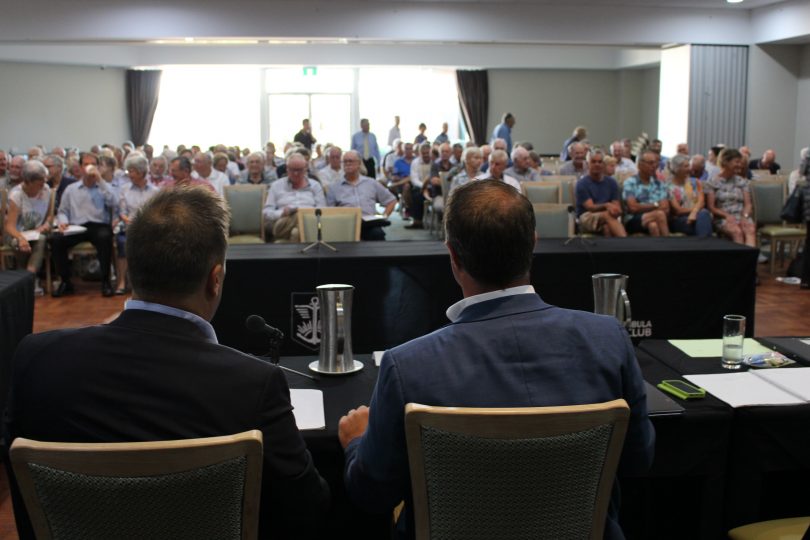
Jason Falinski MP (Liberal) and Committee Chair, Tim Wilson MP (Liberal) face a growing crowd at Merimbula RSL. Photo: Ian Campbell.
The Commonwealth Parliament of Australia came to Merimbula yesterday (February 4) canvassing the impacts of Bill Shorten’s plan to remove refundable franking credits for self-funded retirees if he is elected Prime Minister.
Not a self-funded retiree? This is still relevant.
Around 250 people filed into Merimbula RSL to observe or take part in the public hearing at the invitation of the House of Representatives Standing Committee on Economics. Aside from local media, the event also attracted the national Murdoch press and was broadcast via parliamentary radio.
This was the only regional public hearing held in New South Wales.
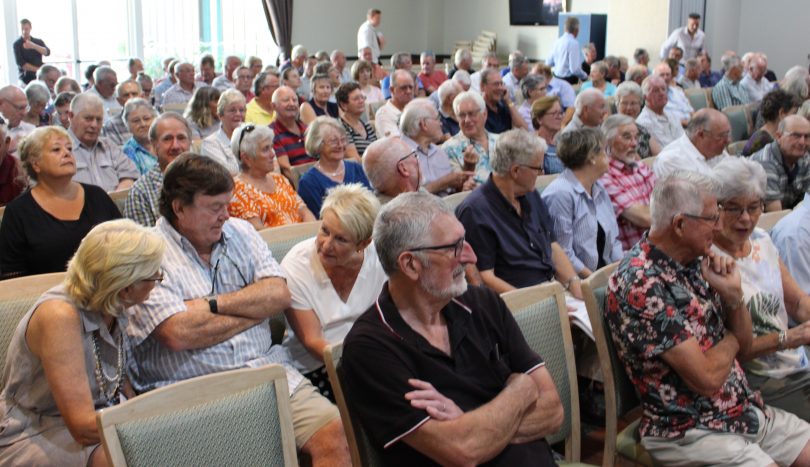
Around 250 people turned out to witness the House of Representatives Standing Committee on Economics. Photo: Ian Campbell.
Committee Chair, Liberal MP Tim Wilson says, “the committee has received well over 1000 submissions, including many from retirees who are concerned they will be forced on to the aged pension if the ability to claim a refund on their franking credits is removed.”
“These hearings provide an opportunity for Australians impacted by a change to refundable franking credits to address the committee directly with a three-minute statement, and we welcome their contributions and participation.”
Twenty-one people took up the opportunity to address the three MPs representing the committee during the 90-minute session. Speakers came from Nimmitabel, Wapengo, Tathra, Tura Beach, Wallagoot, and Pambula, all retired or working towards retirement.
Nineteen of the twenty-one speakers gave a resounding thumbs down to the Shorten policy, cheered on by a supportive room. Only two people, also retirees, spoke to the drivers behind the Labor plan, that being more money for better health and education services while managing the increasingly ageing population.
That is where there is relevance beyond those represented at the RSL yesterday. How is Australia going to deal with the challenges of an ageing population especially in light of the increasing need for health care that comes with that?
Labor believes killing off franking credits needs to be part of that.
Largely, the local testimony dealt with more immediate and personal issues for self-funded retirees and their families.
But first – franking credits: what are they?
Put (I hope) simply, franking credits spare shareholders in a company from paying tax on their share of that company’s profits, because the company itself has already paid tax on those profits. The shareholder, who in this case is also a self-funded retiree, receives credit and gets that back as cash in the same way as an ordinary Pay As You Go taxpayer does if she or he pays too much tax in the year. It stops tax being paid twice on effectively the same money.
The origins of the system are in 1987 when Paul Keating was Treasurer. The Howard Government made further changes in 2000 and 2002.
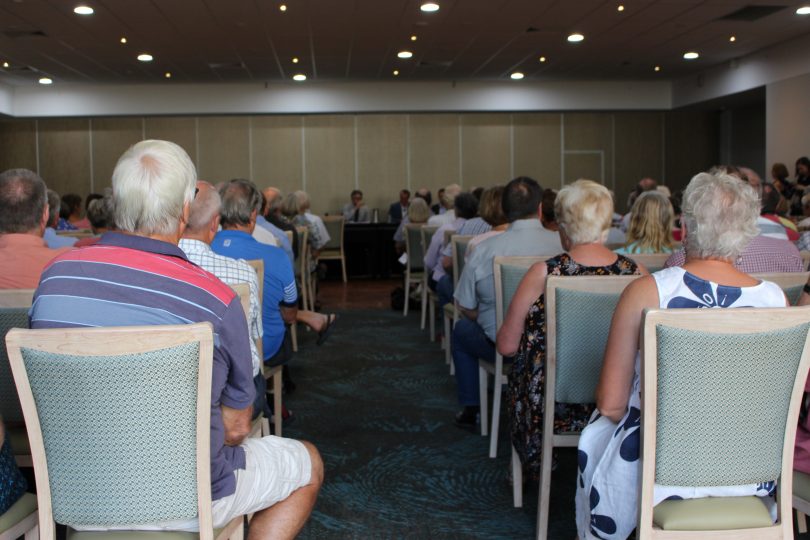
The Commonwealth Parliament of Australia came to Merimbula canvassing the impacts of Bill Shorten’s plan to remove refundable franking credits for self-funded retirees. Photo: Ian Campbell.
The Opposition Leader is suggesting the economy can’t afford it anymore. Speaking on the ABC’s Insiders program on Sunday, Mr Shorten said, “The reason we’re doing this is there is no principle that says it is fair that a non-taxpayer gets a refund, a cash tax refund.”
“But it is also not fair that we’re paying $100 million a week paying non-taxpayers tax cash refunds. It is not fair that we’re spending more on those people than we are for public schools.”
Fairness was a theme that ran through all of the testimony collected by Hansard in Merimbula yesterday. Men and women who planned for their retirement with one set of rules are anxious that a change in government later this year will impact on the money they use day to day, for little extras, or that they leave for their children as an inheritance.
“Under Labor’s proposal my wife’s taxable income would be reduced by 25 per cent to $18,550, this is not a fair go,” says John Esk.
“I have an income of around $50,000, that does not put me in the wealthy, rich category, we can live comfortably,” says Bayden Cameron.
“At our stage of life, my wife and I have no ability to adjust our investment decisions, to replace the projected loss of income,” says Chris Young.
“I consulted my accountant last week, I said – Scott what will this cost me? He estimated about a grand a month,” says Chris Sparks.
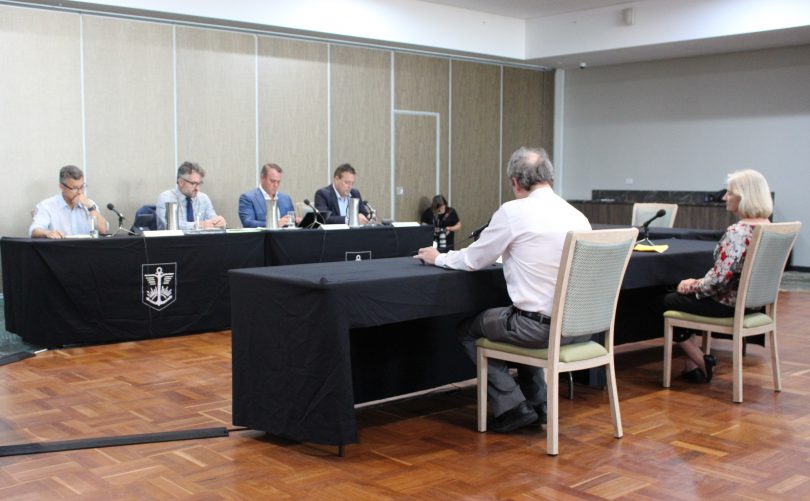
Twenty-one people spoke for around three minutes each. Photo: Ian Campbell.
Offering a wider view of the impacts, Gary Skelton from Kothes Chartered Accountants spoke of the 370 self-managed super funds his firm assists across the Bega Valley and Snowy Monaro.
“Our clients use these franking credits as part of their annual income – to live. No other sections of the community are proposed to have their annual income slashed – it’s just unfair,” he says.
The Liberal candidate for Eden-Monaro Fiona Kotvojs labels the change a ‘Retiree Tax’.
“This will undo investment plans for about 7000 locals who worked hard to be self-reliant in their retirement,” she says.
“When retirees get a refund on share dividends it is because the tax has already been paid by the company.
“Labor’s Retiree Tax would change the goal posts and lead to more people relying on the Age Pension in this electorate,” Dr Kotvojs says.
Labor’s Mike Kelly, the sitting member for Eden-Monaro has labelled the Merimbula public hearing as nothing more than a scare campaign and an abuse of parliamentary processes.
“If we are going to increase our investment in important public services in a fiscally prudent way, we have to recognise that many of the tax concessions that some people have used as an entitlement are no longer sustainable and need to be reformed,” Dr Kelly says.
“This deeply divided Abbott-Turnbull-Morrison Government is now such a policy free zone that they have no economic policy proposals to investigate for the Economics Committee. Instead, they’re using it to attack Opposition policy.”
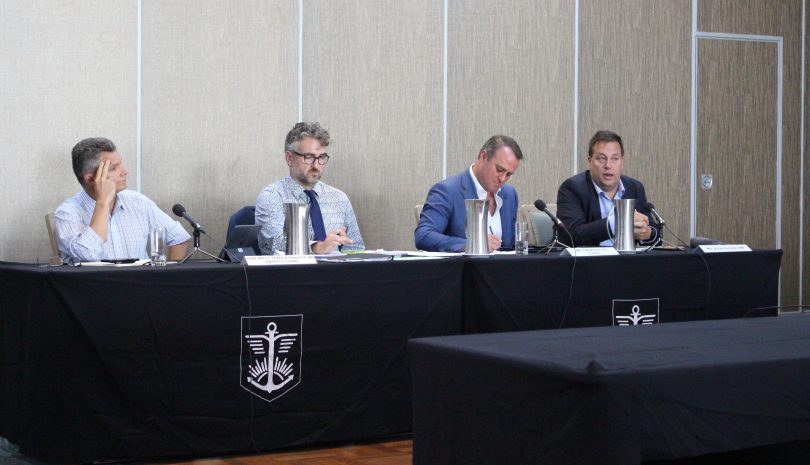
Deputy Chair, Matt Thistlethwaite MP (Labor) Inquiry Secretary, Dr John White, Chair, Tim Wilson MP (Liberal) and Jason Falinski MP (Liberal) Photo: Ian Campbell.
Some speakers in Merimbula did point to changes Labor could make to respond to the concerns. Mr Shorten has rejected any softening of the policy he’s taking to the election.
“To put it directly – do people want a government or a piece of plasticine?” he said on Insiders.
“Do you want a government that has fairness and values at their core or just a lump of putty?”
The concerns expressed by individuals in Merimbula are real and justified. What was missing is the bigger discussion that seems to be happening on the sidelines about an ageing Australia and reform to the tax system. Perhaps we’ll see that the next time parliament visits.
Written submissions to the inquiry are still being taken. More information is available via the Committee’s website.






